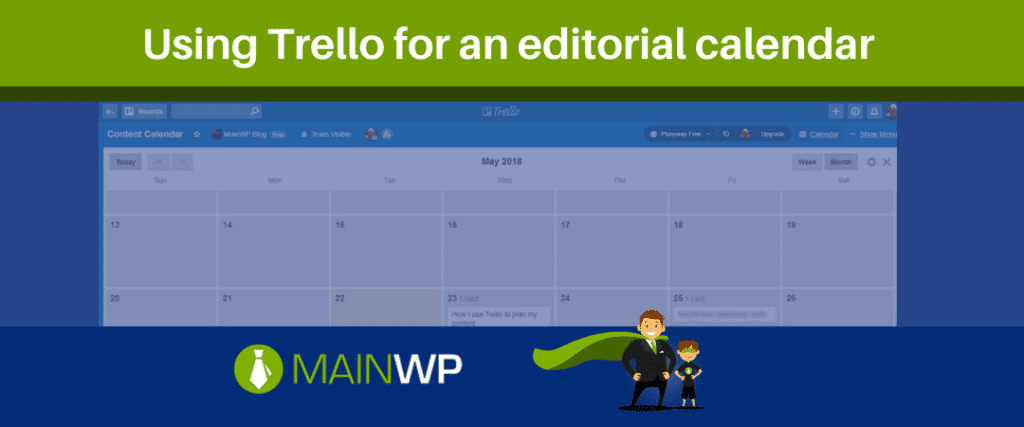Quite possibly, one of the hardest parts of running a blog is being consistent. It stands to reason that if you create goals and outline your schedule, you will come closer to publishing your blog regularly. An editorial calendar can be a huge help in staying consistent.
In early 2015, I restarted my business and new I needed to be blogging on a regular basis. Therefore, I set out to create a schedule that would help me. As a result, I created eight Q&A posts with successful entrepreneurs that I later turned into an e-book. I thought that if I could publish one per month, I would maintain a monthly schedule. It worked.
Additionally, I was able to publish a few other posts that helped including an Influencer type roundup that allowed me to get quotes from a few major online influencers.
It helped restart my business and ultimately lead me to write articles for MainWP.
Once I started writing articles for MainWP, I knew I was going to need to be even more structured publish two posts per week.
I checked out a few content calendar tools such as CoSchedule. I tried it out. I tried out OpsCalendar as well. I recommend them both but have a price point to get started. My goal was to spend as little as I could to make my structure work since I am a one-man team. Trello does that for me.
Creating a Formula
Earlier, in the years 2015 and 2016 I wrote articles for a local business publication in Arkansas. I loved writing those articles. I got to write about startups and entrepreneurship as well as technology. I had the honor of attending some of the state’s top tech and entrepreneurship events, interview the governor, the CEO of a major financial company, do the first article on the fastest growing startup in the state, and interview a legendary business owner.

My boss gave me some advice on how to keep pace. He called it a formula. Formulas and schedules are not uncommon in the publishing industry. They depend on this kind of structure. Print publishers don’t publish as often, but there is a lot of work to do, so relying on a schedule is a must. The web publishing industry sees things move a little faster in terms of regular publishing.
As such, I was creating articles three or four times per week. These articles were more of the reporting variety or turning press releases (which can be time to consume sometimes) as well as Q&A posts.
So, I learned about creating a formula to publish. It helps you know what you are going to do that week.
An editorial calendar helps you stay on track
Why do you need an editorial calendar? Why do you need an editorial calendar tool? Well, this can be a little tricky. If you are solo, you may need something that will help you keep on schedule for your blog post. That could be anything from Google Calendar to Trello, to something like CoSchedule.
Some people will call it a content calendar and others an editorial calendar. Editorial Calendar refers to the days of publishing where magazines will post the top level view of what they will be published at various times of the year. Often, Content Calendars will include blog posts, social media posts, emails, and podcast episodes.
A content calendar can be anything used to plan, schedule, and organize content and other marketing projects. CoSchedule
You could even use another calendar such as Microsoft Office Suite or a paper version. If you are solo, I think you are best to keep your expense low. There is no need to go out and spend money on an application that has fantastic features for a team of publishers.
If you have a team, that is another issue.
For a team, some kind application can be a lifesaver. You might use an app such as CoSchedule, OpsCaendar or even Trello. Content calendars, or editorial calendars, help keep topics top of mind, dates, and schedules filled, and the team on the same page.
Another option for an editorial calendar is a WordPress plugin. While CoSchedule started out as a plugin, it has become a third party application with a plugin connection, but there are several others that are available including PublishPress, Editorial Calendar, Edit Flow, Oasis Workflow, and Nelio Content.
Of course, an editorial calendar WordPress plugin can be a real help in you keeping your articles on schedule. People can use them within the dashboard to keep their articles on schedule. If some on your team doesn’t have access to the WordPress dashboard, then you may need a third party solution.
Trello and the Calendar View
To Create my Content Calendar on Trello, I start with setting up a team. The team is specifically for the MainWP blog. This is not one of their official boards, this is a board I set up to manage to produce content for the MainWP blog.
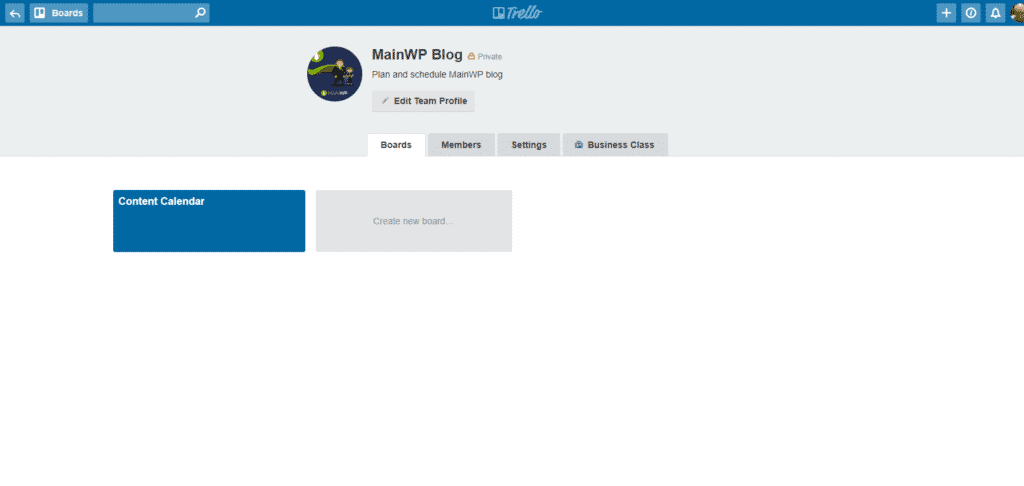
The good thing about creating a team is if I ever have the need to expand and add to my team, it can easily be accomplished as something built into the Trello ecosystem.
Next, I set up a board called Content Calendar. This is where I will put everything I am working on in terms of planning for the blog. Sometimes the MainWP team adds their own posts, but that is not accounted for here. This is my part of the equation.
Then I add five different lists, or columns for my cards: Topics 2018, Scheduled, Interviews, Friday Formula, and Done. Various content calendar boards will use different lists. This is how I set up mine and it has been refined over time.
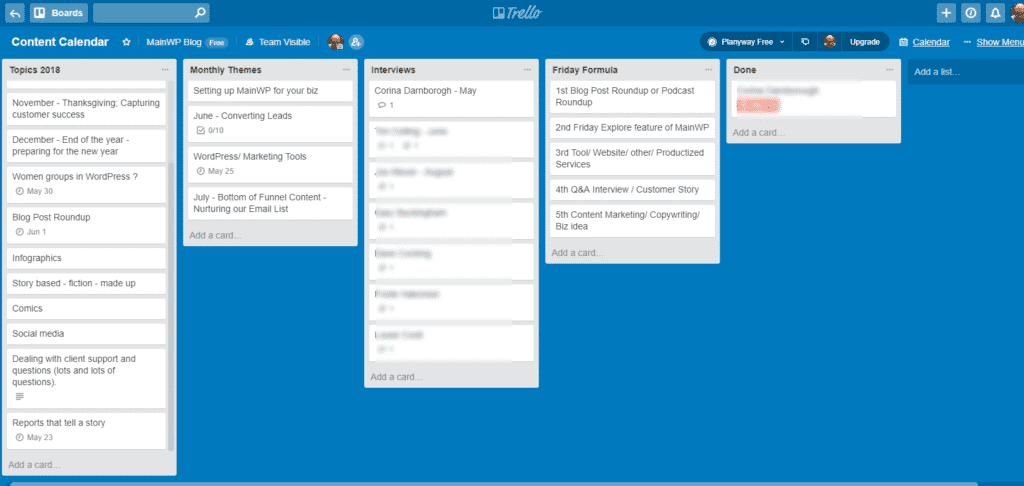
In the Topics 2018 list, I add everything I am thinking about for the coming year. I tend to think in monthly thems, so the topics come from that. For example, as you can see, I am thinking about Attracting traffic as a theme for August.
I will also add ideas for types of posts that are different. Two I have cards for are Infographics and Comics. I’m not quite sure yet what I will do with those.
Each card has a topic and I can easily add notes inside, a checklist if needed, and link to a Google Doc where I might be working on the topic.
The card may not be a monthly topic. For example, you can see this card for “Dealing with client support and questions . . ” which I came across while looking at Reddit. I added a card to the topics column and I added a link to the Reddit post.
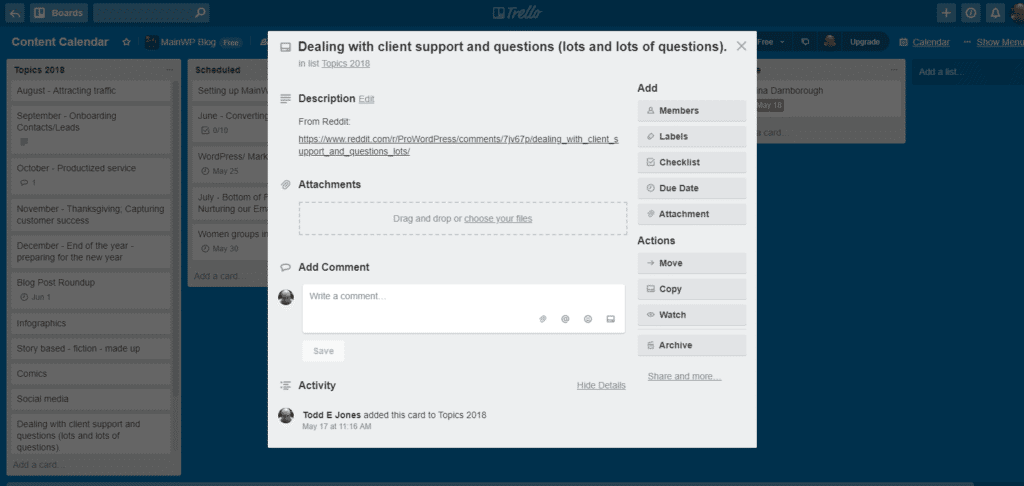
It gives me a place to add notes. If I do more work in a Google Doc, I can add the link here. Once I feel that the card is ready to be scheduled, I move it to the Scheduled column.
Additionally, if it is scheduled, it will be in the calendar view. It’s not foolproof. Sometimes things happen and I change my mind on an article. In the calendar view, I can drag the card to another date and it changes the due date in the card.
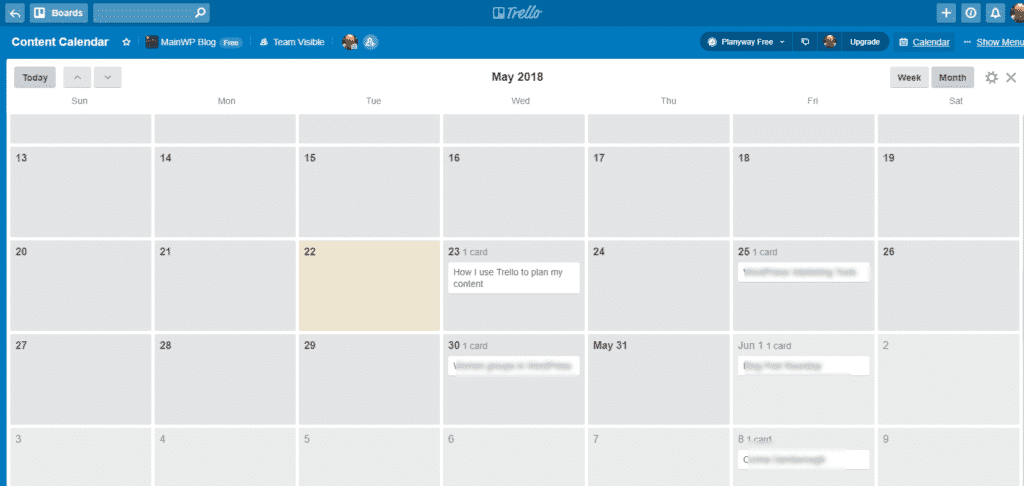
Interviews are for the Q&A interviews I do for the blog. I keep a list of users I think I want to interview. Friday Formula is my formula for articles on Friday. It gives me a post type for each Friday. The Done list is for articles or ideas that are done. They are dragged here and eventually deleted.
If I had a team, I would probably utilize a checklist in the card to make sure certain things were met to ensure a standard of quality. This is typically what others do with their content planning boards.
Trello Editorial Content Examples
Trello as an Editorial Calendar : How To Make It Work
From Editorial Calendar To Acquisition: How ReadWrite Got The Deal Done With Trello
Wrapping it up
I think what you use will depend on how you interact with information. If you like lists, something like Trello or another project management software might be a good choice.
Every major project management software has a calendar and the ability to create lists, so it is something you can use. No one says you have to use what you don’t like.
Maybe you want the ease of using something like CoSchedule or OpsCalendar. Those are great choices too.
I definitely like Trello for helping me as a one-person team. If your team already uses Trello, this would be an easy transition.
Maybe you want to use one of the plugins in the WordPress repository. Those are good choices too. You have to ask yourself if you just need a calendar or if you need more features such as scheduling social media posts.
What do you use for an editorial calendar?

